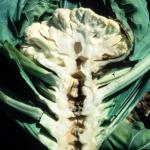Brassicas, Hollow Stem
Hollow stem is a physiological disorder which affects most brassica crops, reducing marketability and often leading to stem rotting by secondary pathogens. Broccoli and collards can also develop a disease with similar symptoms called “hollow stalk”, caused by soft rot bacteria.
Identification:
Symptoms of hollow stem begin as small, elliptical cracks in the inner stem tissue of susceptible crops. The cracks enlarge and merge together as the stem grows, eventually forming a cavity. In severe cases, the cavity can extend the length of the stem and into the head. Often times, the cavity provides access for secondary pathogens to enter the plant, leading to discoloration and rotting of the inner walls of the cavity. However, the cavities can become discolored without pathogens present.
Favorable Conditions:
Hollow stem is likely caused by a combination of environmental factors and crop susceptibility. In general, larger, faster growing cultivars are more susceptible to this disorder. Wide plant spacing and high nitrogen or potassium levels have been shown to increase incidence of hollow stem. Soil moisture also influences the incidence of the disorder, due to its influence on plant growth rates. Hollow stem is commonly attributed to boron deficiency, and although boron deficiency has caused hollow stem in controlled greenhouse settings, it has not been found to consistently be associated with the disorder in field settings, and boron applications are not recommended to manage this disorder. For more information on boron deficiency, click here.
Cultural Controls & Prevention:
- Plant resistant cultivars
- Plant crops at appropriate widths (see the New England Crop Management Guide for recommendations)
- Test your soils and apply nitrogen and potassium fertilizers appropriately (see the UMass Soil and Plant Nutrient Testing Lab website for more information)
Crops that are affected by this disorder:
--Adapted by G. Higgins, September 2016, from the Compendium of Brassica Diseases, eds. S.R. Rimmer, V.I. Shattuck, and L. Buchwaldt
The Center for Agriculture, Food and the Environment and UMass Extension are equal opportunity providers and employers, United States Department of Agriculture cooperating. Contact your local Extension office for information on disability accommodations. Contact the State Center Director’s Office if you have concerns related to discrimination, 413-545-4800 or see ag.umass.edu/civil-rights-information.
